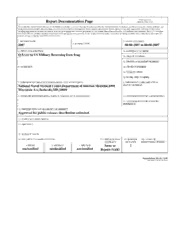
DTIC ADA519165: Q Fever in US Military Returning from Iraq PDF
Preview DTIC ADA519165: Q Fever in US Military Returning from Iraq
Report Documentation Page Form Approved OMB No. 0704-0188 Public reporting burden for the collection of information is estimated to average 1 hour per response, including the time for reviewing instructions, searching existing data sources, gathering and maintaining the data needed, and completing and reviewing the collection of information. Send comments regarding this burden estimate or any other aspect of this collection of information, including suggestions for reducing this burden, to Washington Headquarters Services, Directorate for Information Operations and Reports, 1215 Jefferson Davis Highway, Suite 1204, Arlington VA 22202-4302. Respondents should be aware that notwithstanding any other provision of law, no person shall be subject to a penalty for failing to comply with a collection of information if it does not display a currently valid OMB control number. 1. REPORT DATE 3. DATES COVERED 2007 2. REPORT TYPE 00-00-2007 to 00-00-2007 4. TITLE AND SUBTITLE 5a. CONTRACT NUMBER Q Fever in US Military Returning from Iraq 5b. GRANT NUMBER 5c. PROGRAM ELEMENT NUMBER 6. AUTHOR(S) 5d. PROJECT NUMBER 5e. TASK NUMBER 5f. WORK UNIT NUMBER 7. PERFORMING ORGANIZATION NAME(S) AND ADDRESS(ES) 8. PERFORMING ORGANIZATION National Naval Medical Center,Department of Internal Medicine,8901 REPORT NUMBER Wisconsin Ave,Bethesda,MD,20889 9. SPONSORING/MONITORING AGENCY NAME(S) AND ADDRESS(ES) 10. SPONSOR/MONITOR’S ACRONYM(S) 11. SPONSOR/MONITOR’S REPORT NUMBER(S) 12. DISTRIBUTION/AVAILABILITY STATEMENT Approved for public release; distribution unlimited 13. SUPPLEMENTARY NOTES 14. ABSTRACT 15. SUBJECT TERMS 16. SECURITY CLASSIFICATION OF: 17. LIMITATION OF 18. NUMBER 19a. NAME OF ABSTRACT OF PAGES RESPONSIBLE PERSON a. REPORT b. ABSTRACT c. THIS PAGE Same as 2 unclassified unclassified unclassified Report (SAR) Standard Form 298 (Rev. 8-98) Prescribed by ANSI Std Z39-18 TheAmericanJournalofMedicine(2007)120,e11-e12 CLINICAL COMMUNICATION TO THE EDITOR Q Fever in US Military Returning from Iraq hyponatremia, hepatitis, leucopenia, and thrombocytopenia (Table). In each case, the serology for acute Q fever was To the Editor: positive by an immunofluorescence assay (Focus Technol- ogies Q Fever IFA IgM and IgG assays). Interestingly, the Q fever is a zoonotic infection caused by Coxiella bur- first 2 patients had an isolated positive hepatitis B core netii that may present with acute or chronic clinical mani- antibody with other hepatitis B studies negative. Repeat festations, including a nonspecific febrile illness, pneumo- hepatitis B core antibody testing was negative on dis- nia,hepatitis,orendocarditis.1AlthoughunusualintheUS, charge. In addition to negative cultures of blood, urine, QfeverisendemicintheMiddleEast.Ourcaseseriesraises stool, and cerebrospinal fluid, other negative studies in- the concern that Q fever may be a significant infectious diseasethreattoUSmilitaryservinginIraq.2InNovember cluded stool and throat swabs for Enterovirus by PCR, 2004, 2 military service members from the same Marine malaria smears, serologies for dengue, sand fly fever battalionbecameilluponreturnfroma7-monthtourofduty viruses, Rift Valley Fever, West Nile virus, Leptospira, in Iraq. The first patient was a 35-year-old medical corps- Legionella, Bartonella, Borrelia, Brucella, Ehrlichia, manwhoexperiencedfeverto39.4°C,chills,rigors,severe and several Rickettsia species. retro-orbitalheadache,loosestools,andlowerbackandcalf Although it is endemic in Iraq, only 3 cases of Q fever pain. Cerebrospinal fluid analysis was normal. A chest ra- were reported during the Gulf War (1990-1991).3 In 2003, diograph and an abdominal computed tomography scan anevaluationof62casesofpneumoniainIraq-deployedUS with intravenous and oral contrast also were normal. Al- troops revealed 8 Q fever seroconversions,4 and Leung- though the patient defervesced without antibiotics, his se- rology for Q fever subsequently returned positive, and he was treated with 21 days of doxycycline. The second pa- Table SelectedLaboratoryValuesandSerologicalTest tient, a 23-year-old US Marine infantryman, experienced ResultsforQFever* fever to 41.1°C, chills, rigors, sore throat, headache, and Laboratory(normalrange) Patient1 Patient2 Patient3 diffusemyalgias.Hischestradiographdemonstrateddiffuse bilateral interstitial markings. He defervesced within 24 Serumsodium 130 130 134 hours after starting empiric doxycycline, and his Q fever (137-145mEq/L) Aspartatetransaminase 128 351 305 serology later returned positive. Both soldiers noted goats (17-49Units/L) wandering through the camp but denied other exposures. Alaninetransaminase 155 258 425 More recently, in September 2006, a third patient, a 24- (7-56Units/L) year-old US Marine officer, developed fevers to 39.3°C, Alkalinephosphatase 455 356 186 chills, headache, and photophobia 3 weeks after returning (36-126Units/L) from Iraq. He denied specific exposures. His chest radio- Totalbilirubin 1.8 4.9 0.7 graph was normal, as was analysis of his cerebrospinal (0.2-1.3mg/dL) WBC(4.0-11.0thousand 3.6 3.8 2.0 spinal fluid. He defervesced within 24 hours of initiating cells/(cid:1)L) empiricdoxycycline.HisserologywasnegativeforQfever Platelets(150-450 120 45 89 on admission but was positive when repeated 1 week later. thousandcells/(cid:1)L) All3patientshadsimilarlaboratoryabnormalitiesincluding CoxiellaburnetiiPhaseI (cid:3)1:1024 (cid:3)1:1024 (cid:3)1:1024 IgM((cid:2)1:64) CoxiellaburnetiiPhaseI 1:512 1:32 1:16 IgG((cid:2)1:16) Theopinionsandassertionscontainedhereinarethoseoftheauthors CoxiellaburnetiiPhaseII (cid:3)1:1024 (cid:3)1:1024 1:512 and are not to be construed as official or as reflecting the views of the DepartmentofDefense,theDepartmentoftheNavy,orthenavalservices IgM((cid:2)1:64) atlarge. CoxiellaburnetiiPhaseII (cid:3)1:1024 (cid:3)1:1024 1:128 Requests for reprints should be addressed to Todd D. Gleeson, MD, IgG((cid:2)1:16) DivisionofInfectiousDiseases,DepartmentofInternalMedicine,National WBC(cid:1)whitebloodcell. NavalMedicalCenter,8901WisconsinAvenue,Bethesda,MD20889. *SerologybyFocusDiagnosticsQFeverImmunofluorescenceAssay. E-mailaddress:[email protected] 0002-9343/$-seefrontmatter©2007ElsevierInc.Allrightsreserved. e12 The American Journal of Medicine, Vol 120, No 9, September 2007 Shea et al. recently reported 2 cases of acute Q fever in Mark D. Johnson, MD militaryservicemembers.2Wepostulatethatoursoldiers DepartmentofInternalMedicine acquiredC.burnetiiinfectionviaaerosolizationofinfec- NationalNavalMedicalCenter Bethesda,Md tiousparticlesmostlikelyassociatedwiththegoatsinthe environment. In addition, although rheumatoid factor, Joshua D. Hartzell, MD antiphospholipidantibodies,andsmoothmuscleantibod- DivisionofInfectiousDiseases iesarecommoninpatientswithQfever,1afalse-positive DepartmentofInternalMedicine WalterReedArmyMedicalCenter hepatitis B core antibody has not previously been de- Washington,DC scribed. Our case series raises the concern that Q fever John R. Mascola, MD may be occurring in our military at a higher rate than VaccineResearchCenter previously predicted. As Q fever has a long incubation NationalInstituteofAllergyandInfectiousDiseases period (average 14-21 days) and may present as acute or NationalInstitutesofHealth chronic disease, nonmilitary physicians should be aware Bethesda,Md of this potential diagnosis in individuals with this geo- doi:10.1016/j.amjmed.2007.03.020 graphic exposure. References 1. MaurinM,RaoultD.Qfever.ClinMicrobiolRev.1999;12:518-553. Todd D. Gleeson, MD 2. Leung-SheaC,DanaherPJ.QfeverinmembersoftheUnitedStates armedforcesreturningfromIraq.ClinInfectDis.2006;43:e77-e82. Catherine F. Decker, MD 3. Ferrante MA, Dolan MJ. Q fever meningoencephalitis in a soldier DivisionofInfectiousDiseases returningfromthePersianGulfWar.ClinInfectDis.1993;16:489-496. NationalNavalMedicalCenter 4. AndersonAD,SmoakB,ShupingE,etal.QfeverandtheUSmilitary. Bethesda,Md EmergInfectDis.2005;11:1320-1322.
